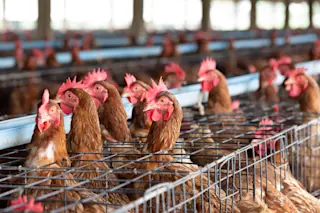More than 500 million eggs were pulled off store shelves last summer due to possible contamination with salmonella. It was the largest food recall of the past decade, according to the Food and Drug Administration.
State authorities in Minnesota started reporting human outbreaks of salmonella disease to the Centers for Disease Control and Prevention (CDC) in May. By October more than 1,800 people were reported ill with fever, abdominal pain, and diarrhea in 29 outbreaks across 11 states. The cdc estimates that, in total, the bacterium poisoned at least 54,000 people, the worst outbreak of salmonella since the agency began surveillance on the bug in the late 1970s. No deaths were reported.
Salmonella enteritidis, one of the major strains to cause food poisoning, is usually associated with eggs. Accordingly, the fda began investigating the nation’s egg supply in August. Eventually agency inspectors found contaminated feed at Wright County Egg, a ...















